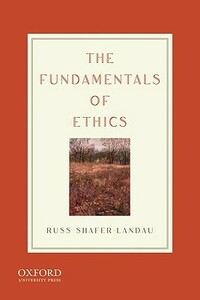You need to sign in or sign up before continuing.
Take a photo of a barcode or cover
informative
reflective
medium-paced
Although it's a textbook, this is, quite simply, one of the best books I've ever read. It's written with warmth and wit, humility and humor, and it presents the main schools of thought regarding ethics, addressing their strengths and weaknesses with respect as well as skepticism. I've puzzled at what the author's own personal views could be for over a decade, since when I first came across it in an earlier edition, and I'm no closer to an answer now than before. This, to me, is a gold standard of an introductory textbook.
I'm truly grateful to Russ Shafer-Landau for this book. It is the main textbook I recall from my undergraduate studies, and the fact that I came back and bought another copy over a decade later is a testament to its quality and importance. So is the fact that it's sparked what is, at least so far, a lifelong passion for ethics and philosophy.
I envy you, dear first-time reader: you're in for a treat!
I'm truly grateful to Russ Shafer-Landau for this book. It is the main textbook I recall from my undergraduate studies, and the fact that I came back and bought another copy over a decade later is a testament to its quality and importance. So is the fact that it's sparked what is, at least so far, a lifelong passion for ethics and philosophy.
I envy you, dear first-time reader: you're in for a treat!
Although it's a textbook, this is, quite simply, one of the best books I've ever read. It's written with warmth and wit, humility and humor, and it presents the main schools of thought regarding ethics, addressing their strengths and weaknesses with respect as well as skepticism. I've puzzled at what the author's own personal views could be for over a decade, since when I first came across it in an earlier edition, and I'm no closer to an answer now than before. This, to me, is a gold standard of an introductory textbook.
I'm truly grateful to Russ Shafer-Landau for this book. It is the main textbook I recall from my undergraduate studies, and the fact that I came back and bought another copy over a decade later is a testament to its quality and importance. So is the fact that it's sparked what is, at least so far, a lifelong passion for ethics and philosophy.
I envy you, dear first-time reader: you're in for a treat!
I'm truly grateful to Russ Shafer-Landau for this book. It is the main textbook I recall from my undergraduate studies, and the fact that I came back and bought another copy over a decade later is a testament to its quality and importance. So is the fact that it's sparked what is, at least so far, a lifelong passion for ethics and philosophy.
I envy you, dear first-time reader: you're in for a treat!
This was one of the primary references for an introduction to ethics university course I took in Spring 2022. We read about 2/3 as part of the course and I read the remaining chapters after the course completed. I found this book to be easy to read with arguments very carefully laid out. It was pretty easy to get the basic grasp of foundational theories in ethics from this textbook. I liked the book enough that I’ll keep an eye out for other texts by this author in the future.
informative
medium-paced
A good introduction to ethics, especially since every chapter concludes with discussion questions with which you can assess your learning. However, at points quite dry and not motivating to follow along with.
informative
reflective
slow-paced
First, the good:
The author gives a solid overview of the more noteworthy ethical theories, along with positives, negatives, and some of the ways that they interact with each other.
We all have our biases and Russ Shafer-Landau is no exception, but I didn't find him overly biased here, contrary to the claims made in some other reviews. In fact, I couldn't tell you which ethical theory he personally aligns with based on reading this text (though I could tell you a few that he does not align with).
The critiques presented against all forms of ethical relativism do expose it as completely incoherent, but that's not the author's fault. He didn't create any of those arguments. Unfortunately, this is hard to swallow for the people who think "doing philosophy" is just making up a theory out of thin air. Especially the section that points out that someone's right to have an opinion doesn't mean that their opinion is equally plausible.
Now for the bad:
I do think his positive and negative portrayal of certain positions were weak. For instance, in one of the earlier chapters, he basically dismisses Plato's entire ethics based on a very poor argument about something said in The Republic.
I don't see how someone could read a dialogue like the Gorgias, where Plato fleshes out the same argument, and think you can wiggle out of his (or Socrates') critiques so easily. It's not simply a matter of whether a person can sleep at night, contrary to the author's very reductionist claims.
Ironically, he later refers to ethical arguments presented by or related to Platonic dialogues, and I'm not just talking about his references to the Euthyphro dilemma.
I'm not a psychological egoist nor even sympathetic to the position, but I thought his arguments against it were quite weak as well and didn't seem to give proper credit to the level of critique they were making.
On the flip side, his "positive" arguments in the Morality and Religion chapter were basically non-existent. Again I must point out some irony here, being that this textbook itself is a strong evidence for the "impossibility of the contrary" argument, since the author admits on numerous occasions that all of the secular ethical theories presented have huge flaws that philosophers can't figure out how to solve.
In response, the secular thinker will of course point to the things they disagree with about a particular religion's ethics, but without a basis for ethics or even a coherent ethical system, what exactly are these critiques based on?
The author also makes the argument that disagreement over religious texts and how to interpret them is a knock against religion-based morality. Yet in the final chapter, he points out how that same argument doesn't actually work against moral objectivism.
Again, isn't this book itself proof that there is mass disagreement about ethics and how to apply them?
Overall, I think the above issues I have with the text all kind of link back to a single fundamental inconsistency, in that Shafer-Landau at times seems to acknowledge and utilize the connection between metaphysics, epistemology, and ethics. And at others, his arguments seem to be based in ignoring that very same connection.
He tries to reduce certain positions, including Platonism, religion, and psychological egoism, to mere materialist claims, when he knows they rely on metaphysical foundations. But then he uses metaphysics and epistemology to critique other positions.
But I still think the book is a solid introduction to the topics covered. And while I would likely disagree strongly with the author on some things, I will reiterate what I said earlier, in that I didn't find him overly biased.
The author gives a solid overview of the more noteworthy ethical theories, along with positives, negatives, and some of the ways that they interact with each other.
We all have our biases and Russ Shafer-Landau is no exception, but I didn't find him overly biased here, contrary to the claims made in some other reviews. In fact, I couldn't tell you which ethical theory he personally aligns with based on reading this text (though I could tell you a few that he does not align with).
The critiques presented against all forms of ethical relativism do expose it as completely incoherent, but that's not the author's fault. He didn't create any of those arguments. Unfortunately, this is hard to swallow for the people who think "doing philosophy" is just making up a theory out of thin air. Especially the section that points out that someone's right to have an opinion doesn't mean that their opinion is equally plausible.
Now for the bad:
I do think his positive and negative portrayal of certain positions were weak. For instance, in one of the earlier chapters, he basically dismisses Plato's entire ethics based on a very poor argument about something said in The Republic.
I don't see how someone could read a dialogue like the Gorgias, where Plato fleshes out the same argument, and think you can wiggle out of his (or Socrates') critiques so easily. It's not simply a matter of whether a person can sleep at night, contrary to the author's very reductionist claims.
Ironically, he later refers to ethical arguments presented by or related to Platonic dialogues, and I'm not just talking about his references to the Euthyphro dilemma.
I'm not a psychological egoist nor even sympathetic to the position, but I thought his arguments against it were quite weak as well and didn't seem to give proper credit to the level of critique they were making.
On the flip side, his "positive" arguments in the Morality and Religion chapter were basically non-existent. Again I must point out some irony here, being that this textbook itself is a strong evidence for the "impossibility of the contrary" argument, since the author admits on numerous occasions that all of the secular ethical theories presented have huge flaws that philosophers can't figure out how to solve.
In response, the secular thinker will of course point to the things they disagree with about a particular religion's ethics, but without a basis for ethics or even a coherent ethical system, what exactly are these critiques based on?
The author also makes the argument that disagreement over religious texts and how to interpret them is a knock against religion-based morality. Yet in the final chapter, he points out how that same argument doesn't actually work against moral objectivism.
Again, isn't this book itself proof that there is mass disagreement about ethics and how to apply them?
Overall, I think the above issues I have with the text all kind of link back to a single fundamental inconsistency, in that Shafer-Landau at times seems to acknowledge and utilize the connection between metaphysics, epistemology, and ethics. And at others, his arguments seem to be based in ignoring that very same connection.
He tries to reduce certain positions, including Platonism, religion, and psychological egoism, to mere materialist claims, when he knows they rely on metaphysical foundations. But then he uses metaphysics and epistemology to critique other positions.
But I still think the book is a solid introduction to the topics covered. And while I would likely disagree strongly with the author on some things, I will reiterate what I said earlier, in that I didn't find him overly biased.
3.5 really well written but so really boring when you read the whole thing in one go. would be perfect for reference though
Grateful for Shafer-Landau’s brevity and approachability. I was looking for an entry level text to help me more broadly understand moral philosophy, and enjoyed my time in this. Is it any good? I have no idea; but it made me think, posed good questions, and usually did a good job explaining both the arguments for and against the views presented. Wish that the sections on metaethics went a bit deeper, but it’s a primer.







